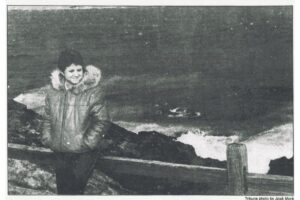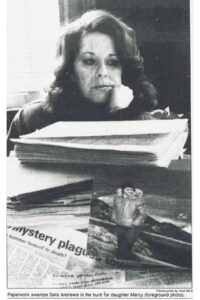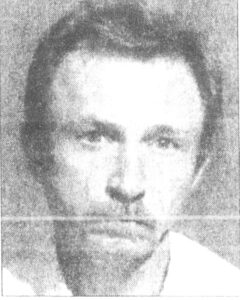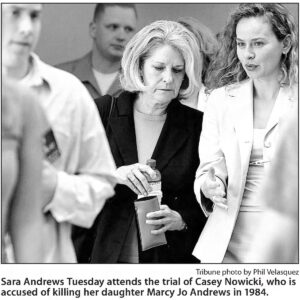Marcy Jo Andrews, 24, grew up in Chicago and had a close relationship with her mother, Sara Andrews. Marcy’s biological father and her mother separated shortly after Marcy’s birth in 1960.
Sara married Robert Andrews in 1971 and changed Marcy’s last name to Andrews.
Marcy’s started a rebellious streak in middle school that would last for years. She started smoking marijuana and used other drugs. By the time Marcy was in high school, her drug use and behavior had heightened. She often skipped classes at Lane Tech High School and dropped out at 16 to work as a cocktail lounge waitress.
Marcy often acted on impulse. Once, she and her best friend, Delores “Dori” Pernell Garrity, hopped on a bus and headed to Marcy’s maternal aunt’s Texas home. Sara had no idea where Marcy was or that the girls were doing drugs on their trip, something Sara discovered later.
After the girls returned to Chicago, Marcy blacked out while driving a friend’s car and got in a car accident. She became concerned that the friend would come after her, so she went on a month-long cross-country trip with a truck driver. During the trip, Marcy called her mother and told her the truck driver’s name, dispatch number, and log number if anything happened to her. Additionally, she called Sara every few days and sent postcards to her step-siblings before returning to Windy City.
According to the Chicago Tribune, Marcy worked at a dance bar called Gazebo’s on Lincoln Avenue and at Tuts, a punk bar near the Belmont elevated station in 1982. She drank heavily and confessed to her mother that she had a problem with alcohol and was going to clean up her act. Marcy mentioned nothing about drugs but wanted to go to a treatment center.
She entered St. Xavier University’s program, Crossroads, and remained there for nine months. During that time, Marcy attended Daley Junior Community College. After leaving rehab, she moved in with her step-grandmother and enrolled at Northeastern Illinois University. In February 1984, she began working at Periodical Publishers on West Lawrence Avenue and stopped attending Northeastern.
Marcy had plans to move to Paducah, Kentucky, and intended to leave Chicago in mid-March to start the summer semester at Paducah Community College in June 1984. However, Marcy never made it to Paducah.
The Disappearance of Marcy Jo Andrews
On Monday, Feb. 13, 1984, Marcy babysat her step-sister while Sara was at work. Marcy had taken a shower and was blow-drying her hair when Sara returned home from work between 5 p.m. and 6 p.m. She told Sara she needed a ride back to her apartment, so Robert drove her home.
Marcy called Dori and asked to meet her at Dori’s workplace, a bar called Jaime’s Elsewhere on Lawrence Avenue. Afterward, the two returned to Dori’s apartment to watch some television, and Marcy stayed the night.
The next day was a warm Valentine’s Day, and Dori and Marcy decided to go to the botanical gardens. Dori invited another friend, Gay Dell, who lived above Dori’s apartment.
The trio got a ride to the apartment of Casey Nowicki at 2558 W. Iowa St. Nowicki was a local drug dealer, and the girls wanted to get high before going to the botanical gardens. Dori and Gay snorted some tic, known as PCP or “angel dust,” while Marcy smoked marijuana and drank a few beers. The girls also recorded a silly message for Nowicki’s answering machine.
People were coming in and out of Nowicki’s apartment, and the girls changed their minds about visiting the botanical gardens, deciding instead to party. They spent approximately five to seven hours at Nowicki’s.
Around 7 p.m., Nowicki offered the girls a ride home in his white car. He lit a joint in the car, took a couple of hits, and passed it to Gay and Marcy in the back seat. Dori was upfront next to Nowicki.
At some point, Nowicki ran the car into a viaduct on Western Avenue. The impact forced Dori’s seat backward, injuring Marcy’s ankle. She could not stand, and Dori thought the ankle looked broken.
Nowicki went crazy over the accident because he did not have car insurance and screamed at the girls, blaming them for the crash. Shortly after, Chicago police arrived at the scene. Nowicki handed Dori the car keys and told her and Gay to wait for the tow truck while he and Marcy went to the police station. He informed Dori that he would take Marcy to the hospital afterward.
Friends Try to Help
Dori and Gay returned to Dori’s apartment and tried to call Marcy to see if she had made it home safely. Marcy did not answer the phone, so Dori called Nowicki, but he never responded either. Instead, Dori heard the answering machine’s funny previously-recorded message by the girls.
Nowicki eventually called Dori back and asked why his car had not been towed to his place. Dori tried explaining that he did not leave her enough money, so the driver took the car to a different location. Nowicki became angry and screamed at her. When Dori asked where Marcy was and whether she had gone to the hospital, Nowicki avoided answering.
Dori made several phone calls to Nowicki after that. Around 10 p.m., she told him, “I will bring you the keys if I can talk to Marcy.” Nowicki put Marcy on the phone.
Marcy sounded frightened and high; her speech was slow and slurred. She told Dori that Nowicki wanted her to stay the night and take her to the hospital the next day. She pleaded to Dori, “Please get me out of here. He’s scaring me. I have to get out of here.”
Dori called her friend, John Hefner, and asked for a ride to Nowicki’s apartment. Dori, Gay, and John knocked on Nowicki’s door, but he did not answer. They walked across the street to a bar to call Nowicki, but he did not respond. The trio knew someone was there because they saw a shadow walking in Nowicki’s front window, but no one pulled the curtains aside. Dori kept calling and left several messages on Nowicki’s answering machine.
Frustrated, Dori and Gay threw rocks at Nowicki’s window. He never answered the door, and eventually, all three went home.
On Feb. 15, 1984, Dori called Nowicki again, and he finally answered. He claimed she never showed up at his apartment when she asked why he had not answered the previous night. He then demanded his car keys and told Dori that Marcy had left. She did not believe him because Marcy could not walk after the accident due to her injured ankle. She told him she would come to his house with his car keys if he let her into his apartment to see if Marcy was there.
Dori took her brother and Gay to Nowicki’s apartment. She rang the doorbell, and Nowicki flew down the stairs to the ground floor, screaming at her. Dori asked to go upstairs, but Nowicki refused. According to Dori, Nowicki threatened to kill her and throw battery acid in her face, indicating he knew where she lived. Dori angrily threw the car keys in his face and left.
Frustrated, Dori returned home and called Sara and Marcy’s step-grandmother but could not reach them. She continued telephoning Nowicki and went to his apartment daily, but it was useless.
That same day, Sara called Marcy to ask if they could get together so Sara could give her a box of Valentine’s Day chocolates. However, Sara was unable to reach Marcy but spoke with Marcy’s step-grandmother, who said Marcy did not call her the night before to tell her she would not be home all night. Sara thought this was unlike Marcy because she knew her mother-in-law liked to wait for Marcy with a sandwich and something to drink.
Sara eventually discovered Marcy had been with Dori but did not know Dori’s address or phone number. She asked her mother-in-law to make a note of everyone who called for Marcy and get their contact information. Sara could not find anyone who had seen or heard from her daughter for several days.
Toward the end of the week, Dori finally reached Marcy’s step-grandmother and asked her to have Sara call her back.
During this time, Sara drove to the family’s second home in Michigan, thinking Marcy might be there. However, the house was empty when she arrived.
A short while later, Sara received a call from her mother-in-law telling her to call Dori, which she did upon her return from Michigan. Dori relayed to Sara the events that occurred with Nowicki. Sara then called the Chicago Police Department.
Sara reported her daughter missing, and police investigated Marcy’s disappearance. Several witnesses told authorities they saw Marcy drugged, naked, and handcuffed to a radiator in Nowicki’s apartment over three days.
A friend of Nowicki’s told authorities that Nowicki placed Marcy’s body in the trunk of a car and said that Marcy died of a cocaine overdose. Nevertheless, detectives had no physical evidence or a body tying Nowicki to a crime, and the case eventually went cold.
Mother’s Search for Daughter
Sara spent years searching for Marcy independently in seedy Chicago neighborhoods. She retraced Marcy’s steps she may have taken, handed out pictures, and even consulted psychics. She hung out in bars, grocery stores, and restaurants.
Sara passed along numerous tips to the police and had files filled with papers containing key names, addresses, and phone numbers. She pulled Marcy’s dental and medical records in case Marcy was found. Additionally, she sent newspaper copies about the search to every Illinois, Indiana, Michigan, and Wisconsin coroner.
The state’s attorney’s office told her that cases without a body are hard to prosecute, although not impossible. It gave her a small amount of hope.
By 1989, Sara was a graphic artist and writer in Near North Chicago and had found nine witnesses to her daughter’s fate. She discovered what may have happened to her daughter and convinced the United States Attorney’s office to believe her version of events.
Unfortunately for Sara, it took 11 years before the police made an arrest.
Arrest and Trial
In 2000, 16 years after Marcy went missing, investigators found several new witnesses in her disappearance.
Authorities reopened the case after U.S. Marshal John Ambrose learned that a fugitive he was pursuing had close ties to Nowicki. That led to the discovery of a 1987 federal court document that laid out the authorities’ suspicions of Nowicki’s involvement in Marcy’s disappearance.
Hanna and Wilson 2000
Eventually, investigators tracked down nearly 30 witnesses, half of whom — including Nowicki’s ex-wife — previously had not been interviewed by police, according to the Chicago Tribune.
At this time, Nowicki resided in the 2500 block of North Sawyer Avenue. In October 2000, he was charged in a seven-count indictment with the first-degree murder of Marcy Jo Andrews and ordered held without bond during an Oct. 27, 2000, court appearance. He was formally charged with first-degree murder two weeks later.
The trial took place in 2005. Testifying for the prosecution were Sara Andrews, Gay Dell, Dori Garrity, Michael John Panisi, and Roger Sexton, to name a few.
The full details of what truly happened to Marcy came out through witness testimonies. The most vital statements came from Panisi and Sexton.
Panisi testified he had known Nowicki for about two months in February 1984. On the night of Feb. 14, 1984, Panisi arrived at Nowicki’s apartment, where he saw Marcy with one hand handcuffed to a cast iron, “old-time” radiator in the kitchen. He said Marcy was “all screwed up on the drugs that Nowicki was selling.”
Panisi asked Nowicki, “Man, what is this? What are you doing with this girl?” Nowicki replied, “She’s too screwed up to be walking around the apartment.” He told Panisi he had given Marcy some THC, which Marcy took of her own free will. “I can’t have her running all around while I’m trying to do my business, and she’s falling all around, and I do not want her to start busting up sh*t and hurt herself.”
Panisi said he removed Marcy’s handcuffs and walked her to the kitchen table to give her some milk, peanut butter, and orange juice. He intended to make her vomit to get the drugs out of her system, but after he gave her the orange juice and milk, she only spitted the food out and vomited a little. The two men clothed Marcy. Panisi told Nowicki to get her help, bought more drugs from Nowicki, and told him he had to leave.
Nowicki told Panisi that he was going to handcuff Marcy again. Panisi took his two grams of drugs and left. The next day, he returned to the apartment and observed the unhandcuffed Marcy on the couch beside the defendant. Another customer of Nowicki’s was also present. Nowicki told the customer, “Here, man. Take care of this girl.” The customer then forced Marcy to perform a sexual act on him.
According to testimony, Marcy appeared out of it during this time. Nowicki told Panisi Marcy had snorted one whole gram of THC. Panisi himself only snorted about a fourth of a gram. Panisi also claimed that Nowicki told him he forced her to take the drugs because “she screwed up his mama’s car.” According to Nowicki, Marcy grabbed his steering wheel and made him crash the car, which was a complete lie because Marcy had been in the backseat of the car, and Dori and Gay never mentioned Marcy doing such a thing.
Nowick showed Panisi the vehicle, which was white and had right front damage, and asked Panisi to help him fix it. However, he did not know anything about cars.
Panisi returned to the apartment on a third day. On this visit, Marcy was lying on the floor, wrapped in a blanket or a rug. He asked Nowicki what happened, and Nowicki said, “She’s died on me, man.” Panisi wanted to call the police, but Nowicki said, “No, help me get her out of here.” Panisi refused. He then witnessed Nowicki place the rolled-up body over his shoulder, walk downstairs, and put it in a green car belonging to Nowicki’s mother.
Sexton testified that he had met Nowicki in 1995 at the Federal Metropolitan Correctional Center. He next saw Nowick in 1998 when Sexton was sentenced to 38 months in the federal correctional facility in Oxford, Wisconsin. He and Nowicki saw each other regularly for the next four years.
Sexton testified that he had a strange conversation with Nowicki in the spring or summer of 1998 “about a girl.” Nowicki had just lost his appeal, and Sexton asked why. Nowicki responded, “Well, that b*tch is still coming back to haunt me after all these years.” Sexton then asked what he was talking about, and Nowicki explained that the judge had sentenced him to too much time and said, “They couldn’t find her body, so they know he done it,” per court documents.
“On Jul. 28, 2005, the jury found Casey Nowicki, then 55, guilty of murder and found that the killing occurred during a felony kidnapping,’ wrote Jeff Cohen in the Chicago Tribune. Nowicki faced life in prison.
Cohen wrote, “Two months later, Judge Rickey Jones told the court that the crime and Nowicki’s criminal history, which included armed robbery and burglary convictions, demanded he stay in prison for the rest of his life.” He sentenced Nowick to life in prison for Marcy’s murder. However, a quick Illinois offender search produced no results of Nowicki currently incarcerated, so he may have been discharged.
Sara told the Chicago Tribune, “This defendant is every woman’s worst nightmare — every parent’s worst nightmare. I would imagine that he became his own mother’s nightmare. “And yet, I can only hope that his worst nightmares are yet to become his everyday reality.”
Marcy’s body has never been found, and her mother has since passed away.
Sources
Anderson, Jon. “Searching for Sara.” Chicago Tribune. Apr. 30, 1989.
Coen, Jeff. “Drug Dealer Found Guilty in 1984 Murder of Woman.” Chicago Tribune. Jul. 29, 2005.
Coen, Jeff. “Killer Gets Life Term for Murder That Judge Decries.” Chicago Tribune. Sept. 29, 2005.
Hanna, Janan, and Terry Wilson. “16 Years Later, Original Suspect in Slaying Seized.” Chicago Tribune. Oct. 28, 2000.







